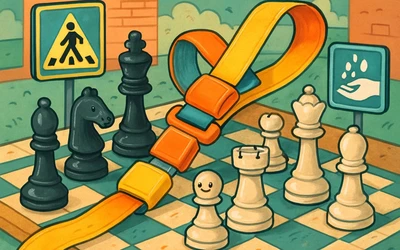About me
Hi! I’m Pranav Shetty, a 31-year-old Indian FIDE Candidate Master and Computer Engineer. Chess has been my passion since childhood, shaping my skills and mindset.
For me, chess is not only a strategic game but also a journey of resilience, grit, and bold decision-making. As your coach, I’m dedicated to sharpening your thinking, building your confidence and equipping you with lessons that extend far beyond the board.
Let’s master the game together!
Email: pranavchess@gmail.com
Playing experience
Best Elo: 2222
Represented India at the prestigious Asian and World Youth Championships held in the UAE, Iran, and Turkey, after securing BRONZE medal twice at the Indian National U-13 Championship.
Bronze medalist at the Commonwealth Youth Chess Championship.
Multiple-time National DSO Gold Medalist (both individual and team events).
State Champion on multiple occasions, consistently performing at the top level in Maharashtra.
Over a 15-year competitive career, I have had the privilege to beat and draw against several GMs and many IMs.
These experiences have shaped my practical understanding of competitive chess and continue to inspire my coaching approach today.
Teaching experience
I have been actively coaching students of all levels, from beginners to advanced tournament players. My teaching style focuses on clarity, structured thinking, and practical improvement tailored to each student's unique needs.
Students not only develop solid technical knowledge but also gain the confidence to apply their skills in real games under pressure. My coaching is tailored to each student’s level and learning pace, ensuring they grow steadily while enjoying the process.
Other experiences
While my primary focus has been competitive play and chess coaching, I bring additional strengths from my background as a Computer Engineer, which helps me introduce structured, analytical thinking into my training sessions.
I also enjoy mentoring students beyond chess, sharing lessons in resilience, problem-solving, and maintaining psychological balance—skills that are valuable both on and off the board.
I am passionate about continuous learning and actively follow top-level chess events, occasionally sharing insights with my students to help them stay updated with modern trends and practical strategies.
Best skills
These are the essential ingredients to grow, sustain, and enjoy your journey as a strong chess player:
Enjoy the Process:
The student should enjoy learning and getting better at chess. This is most important since I have noticed that when they feel good they learn better and faster. I use different techniques such as making things more competitive or talking to them in a certain way which motivates and ignites their interests more.
Customized classes:
Focus on the strengths and weaknesses and customize the classes based on this. For example, some kids have an issue with playing fast even though it's a rapid game while others fear the unknown and play passive chess and some others have issues with typical tactics like hanging pieces and so on. So along with the knowledge of chess patterns (endgame, middlegame and opening) this is something I focus to work more on.
Growth Mindset Over Results:
We focus on learning, effort, and improvement and not just on wins, losses, or ratings. Students are encouraged to stay open to new ideas, embrace change, and avoid rigid thinking. Adaptability is key to long-term success.
Consistent Practice:
Sustained progress comes from the right balance of game analysis, tactical solving and practical play. Regular, disciplined practice with the right feedback loop is what makes all the difference. I advice all students to practice more at home apart from regular coaching sessions and provide regular homework which helps integrate the knowledge and improve faster.
Teaching methodology
How I teach:
1. Mastering Fundamental Principles: Chess fundamentals are not just taught but consistently reinforced through continuous application and regular review of the student’s own games. The goal is to fully integrate these principles into the student’s thinking process. We will also learn how to confidently punish weak moves and poor openings, a skill developed through the careful study of instructive short games.
2. Consistent Practice & Game Analysis: Serious, consistent chess practice combined with in-depth analysis of the student’s own games is the single most important factor for long-term, meaningful improvement.
3. Developing Tactical Awareness: Building tactical sharpness through systematic methods like CCT (Checks, Captures, Threats) and careful attention to hanging and undefended pieces. Focused training helps students quickly observe, calculate, and recognize patterns efficiently in real games.
4. Endgame Mastery & Practical Intuition: Strong emphasis on endgame understanding, starting with essential basic endings to develop intuitive piece coordination. This foundation builds a player’s natural feel for positions and improves practical decision-making in critical phases of the game.
5. Strategic Understanding & Positional Play: Developing key strategic skills such as position evaluation, planning, and prophylaxis through the study of classical games and custom-designed positions suited to the student’s current level and growth path.
6. Opening Understanding Beyond Rote Learning: Learning openings by understanding key ideas, typical pawn structures, piece exchanges, and standard plans—not by rote memorization. We build opening repertoires tailored to the student's style with enough variety to prevent opponents from preparing easily.
7. Practical Play & Chess Psychology: Developing time management skills, resilience, and a strong fighting spirit. Special focus is given to uplifting the student's psychology and cultivating perseverance in difficult situations.
8. Streamlined Thinking & Problem Solving: Sharpening the student's overall thinking process to become effective problem solvers who enjoy the journey of learning and growing through chess.
9. The Art of Game Analysis: Learn how to independently and deeply analyze your own games which is a critical skill for advanced chess players to achieve self-sustained improvement.

